Full-Time Faculty
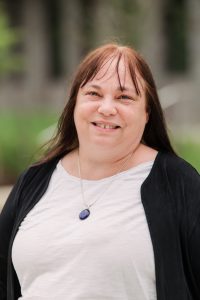 Elizabeth Friar, Ph.D.
Elizabeth Friar, Ph.D.
Translational Life Science Technology Program Director
Phone: TBD
Email: efriar1@umbc.edu
Office: BSE, Room 3104
Dr. Friar received a B.A. in Biology from Oberlin College and then a Ph.D. in Botany from the University of Georgia, focused on the molecular systematics of the woody bamboos. She then completed a postdoc at the University of Arizona with Dr. David Mount and Dr. Robert Robichaux, where she started her work on the molecular systematics and evolution of the Hawaiian silversword alliance, which continues to the present day. She then joined Rancho Santa Ana Botanic Garden (RSABG) as a faculty member in the Botany Program in the Claremont Graduate University, part of the Claremont Colleges, in Claremont California. There, she received several research grants from the National Science Foundation and approximately $1M from W.M. Keck Foundation on data integration in molecular evolution. From there, she joined the National Science Foundation as a Program Officer in the Evolutionary Processes Cluster within the Division of Environmental Biology. Before joining UMBC, she spent one year at Oklahoma State University and then four years at the University of Central Oklahoma, where she has focused on undergraduate teaching.

Manik Ghosh, Ph.D.
Assistant Director of TLST Laboratories
Phone: 240-665-6462
Email: mghosh09@umbc.edu
Office: BSE, Office 3108
Dr. Ghosh earned his Ph.D. in Biology from Sir J. C. Bose Institute, Calcutta, India. Following his PhD, he worked in many international institutes as a research scholar. He worked at the University of Toronto, Canada; National Institutes of Health (NIH); and University of Tennessee Health Science Center. His field of study is cell biology, in particular, the genetic regulation of how immune cells and stem cells migrate to the site of inflammation. His studies aimed to decipher the molecular targets that could be implicated in the therapeutics of human diseases. Dr. Ghosh identified that Wnt5a was a regulator of CXCR4, a pleiotropic chemokine receptor capable of regulating many human diseases, including cancer cell metastasis, HIV, and autoimmunity. On 2014, Dr. Ghosh launched a startup named Annagen Biotech located in Baltimore, MD. The mission of the startup is to develop a non-PCR based personalized disease detection kit.
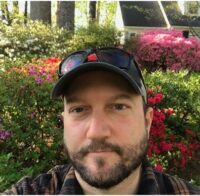 Jeffrey Robinson, Ph.D.
Jeffrey Robinson, Ph.D.
Full-time Bioinformatics Instructor
Phone: TBD
Email: jrobin2@umbc.edu
Office: BSE, Office 3110
Dr. Robinson is an alumni of UMBC, with a BS in Biological Sciences, Master’s in Biotechnology from John’s Hopkins, and a PhD in Biological Sciences from Dartmouth College’s Molecular and Cellular Biology graduate program.
During his career he has worked extensively in both bench science and bioinformatics in a range of research areas. These include 7 years on microbial genome sequencing and proteomics projects, as a research associate with TIGR/J. Craig Venter Institute. His PhD research investigated molecular evolution and phylogenetic applications of miRNA complements and their expression in marine invertebrates.
Robinson’s postdoctoral research at NIH included laboratory studies of molecular network dynamics of epithelial barrier function. His bioinformatics research included biomarker discovery in clinical cohorts for digestive disorders and obesity investigations, and NCI clinical trials for tumor immunotherapy drugs. During his postdoctoral research, Robinson gained significant experience in data science practice and methodologies, and is currently working on computational modeling and integration of clinical, omics, and image datasets.
As bioinformatics course developer and lecturer with UMBC’s Translational Life Science Technology Program, he brings this experience in bioinformatics and biotechnology research to course development and education to the next generation of biomedical workers under the translational science paradigm.
Adjunct Faculty
 Abhay Andar, Ph.D.
Abhay Andar, Ph.D.
Instructor
Dr. Abhay Andar received his Bachelors in Life Science from the University of Mumbai, and his Masters and Ph.D. in Biomedical Science and Engineering from the University of Glasgow, Scotland, UK. Much of his research career has been engaged in microfluidic device design for biological processes-on-a-chip. Dr. Andar is currently a Senior Scientist at Potomac Photonics focusing on early device development and strategies towards commercializing medical devices. Dr. Andar has been involved with biopharmaceutical-based projects throughout his career. More recently he was involved with a DARPA project that focused on Point-of-care systems for biopharmaceuticals manufacturing. Dr. Andar completed his postdoctoral training at the University of Maryland School of Pharmacy focusing on transdermal microneedle technology and dermal formulations for enhanced delivery of nanoparticles and macro-molecules. As a faculty member at UMBC, Dr. Andar believes that one must create an environment that is interactive and collaborative, where problem-solving and critical thinking skills form the core of the class sessions. Dr. Andar is keen on promoting independent thinking, which can be essential for research-based thinking and may be applied to real-life situations.
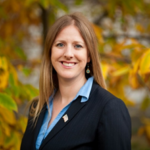
Ashley Grant, Ph.D.
Instructor
Email: amgrant@umbc.edu
Dr. Ashley Grant is a Lead Biotechnologist at the MITRE Corporation and an Adjunct Professor at George Mason University’s Biodefense Program. As a Lead Biotechnologist, she evaluates Department of Defense activities, serves as a subject matter expert on chemical and biological issues across multiple government agencies, and is the Principal Corporate Bio-Nano Laboratory Biosafety Officer. Prior to her role at MITRE, Dr. Grant worked as Senior Biological Scientist at the Government Accountability Office, as an American Association for the Advancement of Science (AAAS) Science and Technology Fellow in the Chemical and Biological Defense Program Office in the Department of Defense and at the National Academies of Science on the Committee on International Security and Arms Control. Dr. Grant received her PhD in experimental pathology and a MPH in epidemiology from the University of Texas Medical Branch at Galveston, a MA in Defense and Strategic Studies from the United States Naval War College, and a BS in Chemistry and a BS in Business Economics and Management from the California Institute of Technology. She is a National Registry of Certified Microbiologists in Biological Safety Microbiology and a certified Project Management Professional. Ashley is the current Caltech women’s water polo single-season goal record holder.
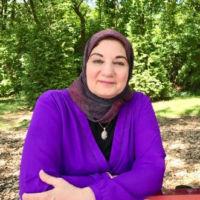
Mina Izadjoo, Ph.D.
Instructor
Email: mizadjoo@umbc.edu
Dr. Mina Izadjoo is the President and Chief Science Officer of Integrated Pharma Services (IPS). Her current research interest in the private sector focuses on developing novel diagnostic, therapeutic and regenerative technologies for hard-to-treat human diseases. Prior to her current position she was the Vice President and Chief Science Officer of Trideum Biosciences. Formerly, she was “Senior Distinguished Scientist” and Director of the Diagnostics and Translational Research Center (DTRC) of the Henry M. Jackson Foundation (HJF) for Advancement of Military Medicine. She served as the Chief of the Microbiology and Wound Biology and Translational Research (WBTR) Division at the Armed Forces Institute of Pathology (AFIP) in Washington DC prior to her position at HJF. Dr. Izadjoo holds an Associate Professorship at Uniformed Services University for Health Sciences (USUHS) and is President Elect of the Washington Academy of Sciences. Dr. Izadjoo is the recipient of numerous awards including the 2017 JWC Best Innovation in North American Award, the FCC Leader of the Year Award in recognition of her internship and training program for college students, and the Innovator of the Year Award from MWBC. Dr. Izadjoo received her Ph.D. in Microbiology and Immunology from Louisiana State University in 1992, followed by six years of post-doctoral fellowships at Texas A&M University and NIH in molecular biology and immunogenomics.
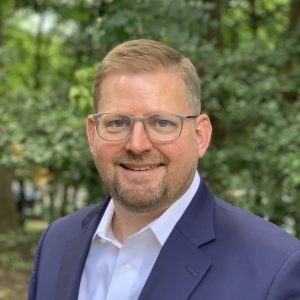 Andrew Kurtz, Ph.D.
Andrew Kurtz, Ph.D.
Instructor
Dr. Andrew Kurtz is a Program Director in the Center for Strategic Scientific Initiatives at the National Cancer Institute (NCI), where he develops and leads programs in emerging scientific areas. Recently, he helped to launch Cancer Grand Challenges, a new partnership established between the NCI and Cancer Research UK, which supports large, international cancer research teams. Dr. Kurtz previously worked in NCI’s Small Business Innovation Research (SBIR) Development Center, where he managed projects focused on the preclinical development of novel cancer therapeutics. In this role, he also led initiatives to assist NCI-funded small businesses in commercializing their innovations, such as the ‘Innovation Corps at NIH’ program. Dr. Kurtz first joined the NCI in 2005 as a AAAS Science and Technology Policy Fellow to provide scientific and communications support to The Cancer Genome Atlas management team. Prior to joining the NCI, he worked in industry developing high-throughput bioanalytical assays to support pharmacokinetic studies for the pharmaceutical sector. Dr. Kurtz received a BS in chemistry from the University of Texas at Austin and a PhD in biochemistry and molecular biology from The University of Texas Medical Branch at Galveston, where his dissertation focused on the cellular pathways that repair DNA-protein crosslinks. Dr. Kurtz also holds an Executive Certificate in Strategy and Innovation from the MIT Sloan School of Management.
 Mark Talbott, Ph.D.
Mark Talbott, Ph.D.
Instructor
Email: ctalbott@umbc.edu
Dr. Talbott currently serves as General Manager of Training and Development, Safety, and Regulatory for Shimadzu Scientific Instruments, Inc. Prior to the current position, he served the Company as Molecular Spectroscopy Product Manager and is currently recognized as a Certified Senior Spectroscopist by the Society of Applied Spectroscopy. He received his B.S. in Chemistry from Indiana University and Ph.D. in Chemistry from the University of Louisville. His research involved the conformational characterization of sphingomyelin and its interactions with water and cholesterol in mammalian lipid lens membranes. Mark has devoted his career to the application of molecular spectroscopy to a range of scientific and industrial applications and interests. Experienced with a wide variety of matrices, he has successfully applied spectroscopy and innovative spectroscopic techniques to the characterization of many chemical systems, including nanoparticles, biological membranes, API’s and drug products, chemical terrorism compounds, thin film coatings, ophthalmic polymers, organic polymers, and inorganic cements. He is the author of peer-reviewed publications, Application Notes, Teaching Notes, and Presentations detailing the use of spectroscopic techniques. Mark has twenty years of experience as adjunct faculty for various Institutions and is currently focused on creating short training segments that emphasize the subtle keys to successful spectroscopy.
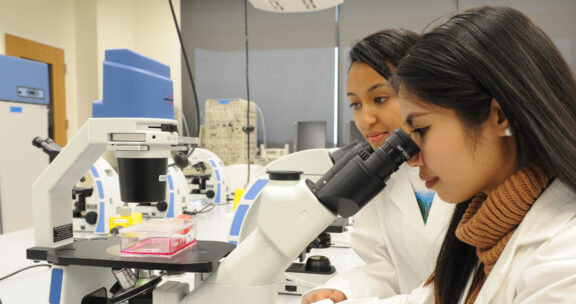

 Elizabeth Friar, Ph.D.
Elizabeth Friar, Ph.D.
 Jeffrey Robinson, Ph.D.
Jeffrey Robinson, Ph.D. Abhay Andar, Ph.D.
Abhay Andar, Ph.D.

 Andrew Kurtz, Ph.D.
Andrew Kurtz, Ph.D. Mark Talbott, Ph.D.
Mark Talbott, Ph.D.
